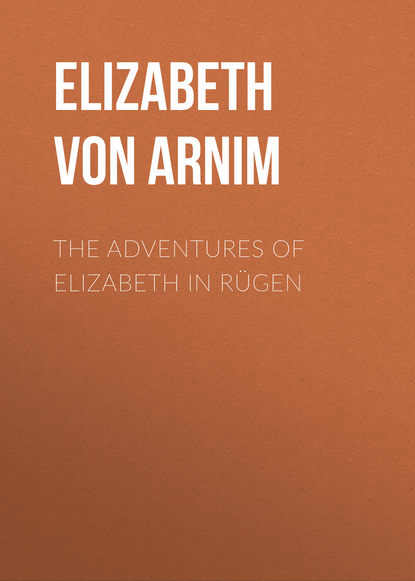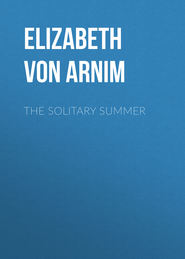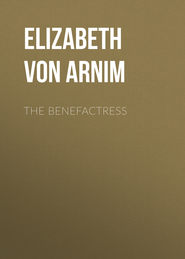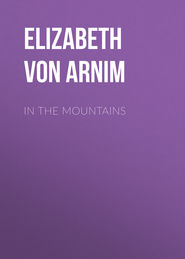По всем вопросам обращайтесь на: info@litportal.ru
(©) 2003-2024.
✖
The Adventures of Elizabeth in Rügen
Настройки чтения
Размер шрифта
Высота строк
Поля
'Frankly, I find nothing more tiring than talking to a person who is persistently playful.'
'That's only those three vanilla ices,' I assured her encouragingly.
'You here, too, Frau Nieberlein?' exclaimed Ambrose, coming in. 'Oh good. You will come with us, won't you? It's a beautiful walk—shade the whole way. And I have just got that work of the Professor's about the Phrygians, and want to talk about it frightfully badly. I've been reading it all night. It's the most marvellous book. No wonder it revolutionised European thought. Absolutely epoch-making.' He bought his biscuits as one in a dream, so greatly did he glow with rapture.
'Come on Charlotte,' I said; 'a walk will do us both good. I'll send word to August to meet us at Stubbenkammer.'
But Charlotte would not come on. She would sit there quietly, she said; bathe perhaps, later, and then drive to Stubbenkammer.
'I tell you what, Frau Nieberlein,' cried Ambrose from the counter, 'I never envied a woman before, but I must say I envy you. What a marvellously glorious fate to be the wife of such an extraordinary thinker!'
'Very well then,' I said quickly, not knowing what Charlotte's reply might be, 'you'll come on with August and meet us there. Auf Wiedersehen, Lottchen.' And I hurried Ambrose and his biscuits out.
Looking up as we passed beneath the window, we saw Charlotte still sitting at the marble table gazing into space.
'Your cousin is wonderful about the Professor,' said Ambrose as we crossed a scorching bit of chalky promenade to the trees where Mrs. Harvey-Browne was waiting.
'In what way wonderful?' I asked uneasily, for I had no wish to discuss the Nieberlein conjugalities with him.
'Oh, so self-controlled, so quiet, so modest; never trots him out, never puts on airs because she's his wife—oh, quite wonderful.'
'Ah, yes. About those Phrygians–'
And so I got his thoughts away from Charlotte, and by the time we had found his mother I knew far more about Phrygians than I should have thought possible.
The walk along the coast from Sassnitz to Stubbenkammer is alone worth a journey to Rügen. I suppose there are few walks in the world more wholly beautiful from beginning to end. On no account, therefore, should the traveller, all unsuspecting of so much beauty so near at hand, be persuaded to go to Stubbenkammer by road. The road will give him merely a pretty country drive, taking him the shortest way, quite out of sight of the sea; the path keeps close to the edge of the cliffs, and is a series of exquisite surprises. But only the lusty and the spare must undertake it, for it is not to be done under three hours, and is an almost continual going down countless steps into deep ravines, and up countless steps out of them again. You are, however, in the shade of beeches the whole time; and who shall describe, as you climb higher and higher, the lovely sparkle and colour of the sea as it curls, far below you, in and out among the folds of the cliffs?
Mrs. Harvey-Browne was sufficiently spare to enjoy the walk. Ambrose was perfectly content telling us about Nieberlein's new work. I was perfectly content too, because only one ear was wanted for Nieberlein, and I still had one over for the larks and the lapping of the water, besides both my happy eyes. We did not hurry, but lingered over each beauty, resting on little sunny plateaus high up on the very edge of the cliffs, where, sitting on the hot sweet grass, we saw the colour of the sea shine through the colour of the fringing scabious—a divine meeting of colours often to be seen along the Rügen coast in July; or, in the deep shade at the bottom of a ravine, we rested on the moss by water trickling down over slimy green stones to the sea which looked, from those dark places, like a great wall of light.
Mrs. Harvey-Browne listened with a placid pride to her son's explanations of the scope and nature of Nieberlein's book. His enthusiasm made him talk so much that she, perforce, was silent; and her love for him written so plainly on her face showed what she must have been like in her best days, the younger days before her husband got his gaiters and began to grieve. Besides, during the last and steepest part of the walk we were beyond the range of other tourists, for they had all dropped off at the Waldhalle, a place half-way where you drink, so that there was nothing at all to offend her. We arrived, therefore, at Stubbenkammer about six o'clock in a state of perfect concord, pleasantly tired, and hot enough to be glad we had got there. On the plateau in front of the restaurant—there is, of course, a restaurant at the climax of the walk—there were tables under the trees and people eating and drinking. One table, at a little distance from the others, with the best view over the cliff, had a white cloth on it, and was spread for what looked like tea. There were nice thin cups, and strawberries, and a teapot, and a jug in the middle with roses in it; and while I was wondering who were the privileged persons for whom it had been laid Gertrud came out of the restaurant, followed by a waiter carrying thin bread and butter, and then I knew that the privileged persons were ourselves.
'I had tea with you yesterday,' I said to Mrs. Harvey-Browne. 'Now it is your turn to have tea with me.'
'How charming,' said Mrs. Harvey-Browne with a sigh of satisfaction, sinking into a chair and smelling the roses. 'Your maid seems to be one of those rare treasures who like doing extra things for their mistresses.'
Well, Gertrud is a rare treasure, and it did look clean and dainty next to the beer-stained tables at which coffee was being drunk and spilt by tourists who had left their Gertruds at home. Then the place was so wonderful, the white cliffs cutting out sheer and sharp into the sea, their huge folds filled with every sort of greenery—masses of shrubby trees, masses of ferns, masses of wild-flowers. Down at the bottom there was a steamer anchored, the one by which the Harvey-Brownes were going back later to Binz, quite a big, two-funnelled steamer, and it looked from where we were like a tiny white toy.
'I fear the gracious one will not enjoy sleeping here,' whispered Gertrud as she put a pot of milk on the table. 'I made inquiries on arrival, and the hotel is entirely full, and only one small bedroom in a pavilion, detached, among trees, can be placed at the gracious one's disposal.'
'And my cousin?'
'The room has two beds, and the cousin of the gracious one is sitting on one of them. We have been here already an hour. August is installed. The horses are well accommodated here. I have an attic of sufficient comfort. Only the ladies will suffer.'
'I will go to my cousin. Show me, I pray thee, the way.'
Excusing myself to Mrs. Harvey-Browne I followed Gertrud. At the back of the restaurant there is an open space where a great many feather-beds in red covers were being aired on the grass, while fowls and the waiting drivers of the Sassnitz waggonettes wandered about among them. In the middle of this space is a big, bare, yellow house, the only hotel in Stubbenkammer, the only house in fact that I saw at all, and some distance to the left of this in the shade of the forest, one-storied, dank, dark, and mosquito-y, the pavilion.
'Gertrud,' I said, scanning it with a sinking heart, 'never yet did I sleep in a pavilion.'
'I know it, gracious one.'
'With shutterless windows on a level with the elbows of the passers-by.'
'What the gracious one says is but too true.'
'I will enter and speak with my cousin Charlotte.'
Charlotte was, as Gertrud had said, sitting on one of the two beds that nearly filled the room. She was feverishly writing something in pencil on the margin of The Beast of Prey, and looked up with an eager, worried expression when I opened the door. 'Is it not terrible,' she said, 'that one should not be able to do more than one's best, and that one's best is never enough?'
'Why, what's the matter?'
'Oh everything's the matter! You are all dull, indifferent, deadened to everything that is vital. You don't care—you let things slide—and if any one tries to wake you up and tell you the truth you never, never listen.'
'Who—me?' I asked, confused into this sad grammar by her outburst.
She threw the pamphlet down and jumped up, 'Oh, I am sick of all your sins and stupidities!' she cried, pulling her hat straight and sticking violent pins into it.
'Whose—mine?' I asked in great perplexity.
'It would almost seem,' said Charlotte, fixing me with angry eyes,—'it would really almost seem that there is no use whatever in devoting one's life to one's fellow-creatures.'
'Well, one naturally likes to be left alone,' I murmured.
'What I try to do is to pull them out of the mud when they are in it, to warn them when they are going in it, and to help them when they have been in it.'
'Well, that sounds very noble. Being full of noble intentions, why on earth, my dear Charlotte, can't you be placid? You are never placid. Come and have some tea.'
'Tea! What, with those wretched people? Those leathern souls? Those Harvey-Brownes?'
'Come along—it isn't only tea—it's strawberries and roses, and looks lovely.'
'Oh, those people half kill me! They are so pleased with themselves, so satisfied with life, such prigs, such toadies. What have I in common with them?'
'Nonsense. Ambrose is not a toady at all—he's nothing but a dear. And his mother has her points. Why not try to do them good? You'd be interested in them at once if you'd look upon them as patients.'
I put my arm through hers and drew her out of the room. 'This stuffy room is enough to depress anybody,' I said. 'And I know what's worrying you—it's that widow.'
'I know what's an irritating trick of yours,' exclaimed Charlotte, turning on me, 'it's always explaining the reason why I say or feel what I do say or feel.'
'What, and isn't there any reason?'
'That widow has no power to worry me. Her hypocrisy will bear its own fruit, and she will have to eat it. Then, when the catastrophe comes, the sure consequence of folly and weakness, she'll do what you all do in face of the inevitable—sit and lament and say it was somebody else's fault. And of course every single thing that happens to you is never anybody's fault but your own miserable self's.'
'I wish you would teach me to dodge what you call the inevitable,' I said.
'As though it wanted any teaching,' said Charlotte stopping short in the middle of the open space before our table to look into my eyes. 'You've only not got to be silly.'
'But what am I to do if I am silly—naturally silly—born it?'











